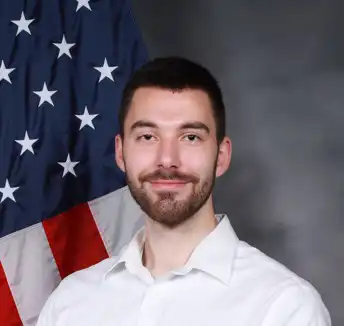Mitigating the effects of injury and chemical exposure
Meet Jacob “Jake” Janssen
Jacob “Jake” Janssen watched his mom fight and beat thyroid cancer when he was a teenager and interned at Penn State Milton S. Hershey Medical Center during high school. He developed a passion for health and uplifting his community, and even participated in a 46-hour charity event with his mom to raise money for pediatric cancer treatments and research, including for kids he knew personally. These early experiences shaped who Janssen is today. He earned his bachelor’s degree in immunology and infectious disease from Penn State University and is anticipated to earn his master’s degree in disaster management from Tulane University in 2026.

Jacob “Jake” Janssen, U.S. Army Medical Research Institute of Chemical Defense (USAMRICD) participant, is passionate about public health and disaster management. (Photo Credit: Jake Janssen)
Now, Janssen is learning from his mentor, Dr. Erik Johnson, as a U.S. Army Medical Research Institute of Chemical Defense (USAMRICD) participant with the Oak Ridge Institute for Science and Education (ORISE) within the Neuroscience Department and Medical Toxicology Division.
“I applied because the opportunities to perform research under the U.S. Army to help mitigate disasters and mass casualty events were unique and very involved, from model development to manuscript writing,” said Janssen.
The USAMRICD is the Department of Defense's lead laboratory for medical chemical defense research. As a subordinate element of the U.S. Army Medical Research and Materiel Command (USAMRMC), the institute conducts research for development of medical countermeasures to treat exposure to various chemical threat agents for protection of soldiers and civilians. Scientific disciplines at USAMRICD include, but are not limited to, chemistry, biology, biochemistry, pharmacology, molecular biology, neuroscience, toxicology, physiology, psychology and immunology.
He is a part of multiple, potentially lifesaving, projects, ranging from treatments to traumatic brain injury, organophosphate (a nerve agent) exposure and studying the combined effect of physical trauma and chemical exposure. By spotlighting these projects, particularly the effects of chemical exposure and physical trauma, Janssen and the rest of the Johnson team at USAMRICD can test for the most effective dosage and administration pathways. These treatments can be used both for civilians and soldiers on the battlefield. He hopes the studies will improve medical guidelines for the United States and ally nations.
Janssen attends to a myriad of tasks and learning opportunities, including assisting with and performing small animal surgeries, behavioral testing for cognition after exposure and data analysis. He notes one of the most interesting parts of his fellowship so far is seeing a two-photon microscope, which allows the viewer to see neurons firing in real time. Janssen notes, “these skills, experiences and more have made me a well-rounded writer, public speaker and scientist that can adapt in constantly changing work environments.”

“Science is vital for the advancement of humanity and how we live a happy and healthy life. Without the protection and integrity of such a key part of society, we are doomed to fail as a species. It is up to all of us to find new ways to help others and lift the community.” (Photo Credit: Jake Janssen)
Janssen presented the projects’ findings at several conferences, including the ORISE Research Symposium, Society for Neuroscience and the Society of Toxicology. He recommends the USAMRICD program and ORISE to others.
“The scientific community under the U.S. government is extensive and vital to improving healthcare and security across the nation and abroad,” said Janssen. “Being able to perform research within this system allows ORISE participants to navigate the network better as well as engage in topics of interest.”
After his fellowship ends, Janssen hopes to put his new skills and continued passion into disaster resilience and environmental protection within vulnerable communities. In the meantime, he continues to study medical innovations with USAMRICD and is simultaneously working towards earning his master’s degree.
The research participation program at USAMRICD is administered by the Oak Ridge Institute for Science and Education (ORISE) under an agreement between the U.S. Department of Energy (DOE). ORISE is managed for DOE by ORAU.
From the ORISE Featurecast: ORISE is the backbone of respect between students and researchers, a conversation with Jake Janssen
Jake Janssen is an ORISE Research Program Participant appointed to the U.S. Army Medical Research Institute of Chemical Defense. His research focuses on neuroscience, and hazardous chemicals in trauma medicine. In this episode of the ORISE Featurecast, he says "We look at novel polytrauma scenarios involving organophosphates and other pharmaceutical grade drugs, and traumatic brain injuries or TBIs. We want to improve upon treatment guidelines and combat casualty care through new polypharmacy methods, and also identify and study chemicals of concern so that the United States is more prepared for an impending chemical threat from any adversary we may see." In Janssen's conversation with host Michael Holtz, he talks about the underlying importance of his research, his career trajectory and some of the obstacles he has overcome in his life and career.

